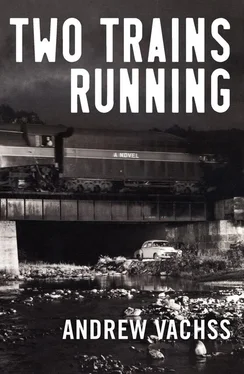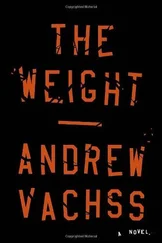“We weren’t doing anything people didn’t want done, girl. Other-wise, we couldn’t have made a living at it.”
“Beau, you don’t have to take care of everyone, like you were their father.”
“Who’s going to do it, if I don’t? Somebody’s got to run the show. Our show, I mean. If we don’t have our own people in charge, some other outfit will just come in, and…”
“Is that why you want Harley to…?”
“He’s the one I’ve been thinking of, yeah. I’ve been watching him for a long time, and he’s got the cold mind you need to run a complicated operation like ours. Sammy says so, too. But if Harley ever wants to be in charge, he’s got to show what he’s made of, elsewise no one will follow him. You know that, Cyn. If I hadn’t-”
“Don’t, Beau.”
“Don’t what?” the man in the wheelchair said, defiantly. “Say the truth? I’ll say it, Cyn. I’m not afraid of it. If I hadn’t killed Lenny Maddox, he would have eaten us like a slice of apple pie, with vanilla ice cream on top. One bite-poof!-we’re gone. Right down his pig’s gullet.”
“I don’t like to talk about that.”
“It was him or us,” Beaumont said, reciting his lifelong mantra.
“I…”
“Honey, you had your little salary from the dress shop, and I had what we were making from the bowling alley. When we were kids, remember where we lived? Remember how we lived? All of us would have fit into one room of this house.”
“We never needed such a-”
“I didn’t kill Lenny Maddox to buy us a house, honey. We had no choice. No choice I could live with, anyway.”
“I thought you were going to die that day, Beau. I was so terrified, I was frozen. I just sat and stared at the telephone. I knew it was going to ring, and the… somebody was going to tell me you were dead.”
“I remember when they searched me that last time,” Beaumont said. The iron of his eyes began to lighten, like an abating storm. “They just sort of slapped at my clothes, before they let me into the back room. The cripple in his wheelchair, getting an audience with the pope. Maybe they thought Lenny was going to lay his hands on me, cure me like one of those faith healers.”
“Beau…”
“Yeah, what did he have to worry about?” the man in the wheelchair went on, relentlessly. “It was broad daylight, not even ten in the morning, when we drove up to that roadhouse he owned. Me and Luther. The cripple and the retard.”
“Beau!”
“No, that was good, Cyn. It’s always good when they under-estimate you. Lenny thought I was coming to beg. That’s what cripples are, right? Beggars. He had a couple of men around, like he always did. But he’d been feeding at the trough so long, he forgot where he came from. He let them stand around outside his office, so I wouldn’t be embarrassed, having to beg in front of them.
“I thought I might die that day, too, Cyn. And I was ready for it. I don’t mean I was looking to die, but I could face it. The same way I made all the other guys face it. Before we took off, I told them, ‘By tonight, we’ll have us some ground. It’s either going to belong to us, or we’ll be under it.’ ”
Cynthia turned toward her brother. Her face was as blanched as it had been on that day so many years ago, when she had waited for the call. And, just as then, she never said a word.
“He never knew how I could move in this thing,” Beaumont recalled, patting his wheelchair as if it were a prized racehorse. I kept talking, about the bowling alley and how I wanted to expand it, maybe even add a skating rink. That’s what I was there for, to ask his permission. Before he knew what was going on, I had rolled right up to where he was sitting. I put everything I had into that one punch. Right here”-touching a spot just below the inverted V of his rib cage-“and all the breath just whooshed out of him. Then I got these”-holding up two clawed hands-“around his throat and clamped. He never made a sound.
“When I wheeled myself out of his office, I had Lenny’s own pistol in my hand. Got both of his men”-snapping his fingers, twice-“before they even knew something was wrong. And then Luther opened up, just like I had told him.
“Our guys swooped in the minute they heard the first shots. All we had to do was hold our position: me inside the office, Luther out by the car.
“The minute I saw Lymon and Sammy coming through the trees, I knew we were going to make it. Lenny’s boys never had a chance. It was over so fast, I think I must have held my breath all the way through it.”
“I was so-”
“The paper said it was a gang war. Remember, honey? The Locke City Massacre, they called it. But the cops never even came around-there wasn’t a single one of Maddox’s men left to finger us. We lost Everett that day, but we didn’t leave him there. Faron got hit, too, but he was just winged.
“The cops put it down to out-of-town talent. I knew Lenny Maddox had to be doing the same thing to other people he was doing to us. People a lot bigger than we were. Everybody figured he finally stepped on the wrong toes.
“Lenny Maddox, he was never really a big man. It’s just that, around here, he was bigger than anyone else. He never bothered to organize things-we were the first ones to do that. And by the time outsiders started looking our way, we were dug in too deep.”
“That’s just what it feels like sometimes, Beau,” Cynthia said, looking down at her hands clasped in her lap. “That we’re dug in too deep.”
1959 October 04 Sunday 15:05
“Walk with me, Brian O’Sullivan,” Mickey Shalare said to a square-shouldered man whose flattened nose, cauliflower ears, and scar-tissue eyebrows marked his profession as clearly as would a doctor’s bag in a never-callused hand.
The former prizefighter got to his feet with a feline grace that belied his time-thickened body. He tossed down what was left of his pint with one hand, and wiped his mouth with the back of the other.
The two men left via the rear of the Shamrock Inn without speaking. Shalare’s pristine white ’57 Chrysler 300C hardtop was parked parallel to the wall of the alley, only the driver’s door accessible. He unlocked the car, climbed in, and slid over to the passenger side.
“Get in, then,” he called to Brian.
Puzzled, the boxer got behind the wheel. The Chrysler was Shalare’s pride and joy-no one else was ever permitted to drive it.
“Take us out to the Flats, Brian.”
The boxer started the car, then crawled forward to where the alley opened onto a side street.
“Come on,” Shalare told him. “This isn’t some pram you’re pushing here.”
At Brian’s glance, the smaller man said, “Not much good having a motor like this if you can’t make it go, is there?”
“Sure. But how come I’m the one driving?” Brian asked, with characteristic bluntness.
“You’re driving because you’re the man I trust.”
“With your car?”
“With my life,” Shalare said, in that steel-in-honey tone all his men recognized instantly.
They rode in silence for about twenty minutes, through city streets, out past a subdivision that had been built on the town’s hopes for a huge paper mill-a hope that had died an unnatural death years ago.
The houses, formerly individual monuments to working-class pride, had fallen to a depth below disrepair. Once-proud patches of greenery on the postage-stamp lawns had given way to arid dirt; neatly trimmed trees and hedges had been replaced with rusting car parts and salvaged junk.
The big Chrysler cleared its throat and leaped forward, as if fleeing the decay around it.
“This is some piece of machinery, yours, Mickey.”
“It is. The Yanks know how to build things, I’ll give them that. This one, it’s not as posh as a Jag, maybe, but it’ll run away from any of them on the highway. Won’t be breaking down every other day, either.”
Читать дальше












